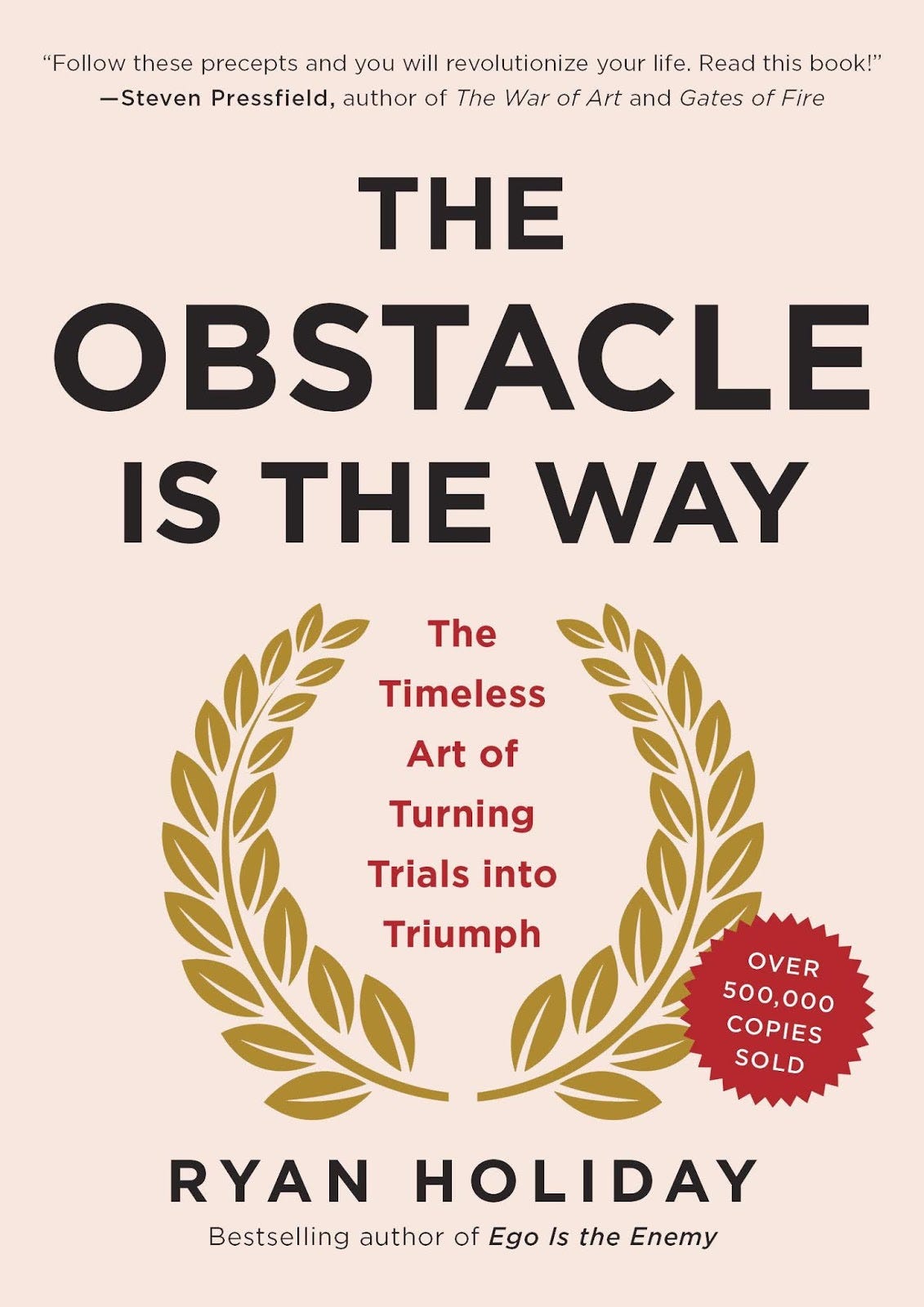I never loved reading until a book changed my life.
In 2021, I tore my ACL playing hockey. I had to get knee surgery. I was a certified cripple for six weeks. The only source of a smile came from watching Sopranos with my dad.
At the time, I bought a book that just sounded right: The Obstacle is the Way by Ryan Holiday.
Most of Holiday’s books deal with Stoicism, an ancient Greek philosophy.
Usually philosophy works better than melatonin, but he ignites old insights with short stories from historical leaders like Steve Jobs and Amelia Earhart.
The book was like nothing I learned in school. Instead of memorizing the color of Hamlet’s underwear for a chapter quiz, I learned a life skill: how to turn adversity to my advantage.
Let me explain.
For Me, Not To Me
When the doctor showed me my X-rays, he diagnosed a torn ACL, a torn MCL, and damaged cartilage. He suggested surgery. Six weeks on crutches. Six months to recover.
No weight lifting, no fly fishing, no skating, no hiking, no walking. My mom cooked me eggs for breakfast every day. For the first time since I was nine months old, I had to learn how to walk again.
In my journal, I wrote it down like a crime scene report. What went down: Ligaments torn. Knee stabbed. Soul sliced. This sucks ass. What’s the meaning of anything? What do I do?
Then I read about the concept of amor fati in the book. It’s Latin for “love of fate.”
Through this lens, Holiday taught me how to reframe my pain:
“The goal is:
Not: I’m okay with this.
Not: I think I feel good about this.
But: I feel great about it.
Because if it happened, then it was meant to happen, and I am glad that it did when it did. I am meant to make the best of it.”
I tore my ACL. I couldn’t walk. My life was ruin…—nope, that’s a thought! The first two things were facts in my personal history book. But how could I feel “great” about them?
I had to believe that it happened for me, not to me. That when I looked back in the future, it would make more sense. I just had to love it. I can’t deny this: it’s real. I’m stuck in bed, but I’m so grateful that my parents can take care of me. [1]
To be clear, this isn’t saying to give up. It’s about accepting external events:
“It is far easier to talk of the way things should be. It takes toughness, humility, and will to accept them for what they actually are. It takes a real man or woman to face necessity.”
I couldn’t change it. Just like when when a Tesla cuts me of on the I-25. But what could I change? What was in my control?
My response.
Add Water

Let’s say you pull up to your driveway and see your house in flames.
You don’t think, Ugh, I’m so pissed that my Bradbury books are on fire! This was never supposed to happen. Let’s pull up the Amazon app and order some new ones right before the fire spreads.
Not. That’s not very helpful. You call 9-1-1 and try to restrain the flame.
To put out the fires of life, you have to accept reality:
“When a doctor gives you orders or a diagnosis—even if it’s the opposite of what you wanted—what do you do? You accept it. You don’t have to like or enjoy the treatment but you know that denying it only delays the cure.”
After I accepted my diagnosis, I took positive action. I researched my ACL rehab. I squeezed my atrophied left quad until I could activate it. I became a pro patient. I started reading books. I attacked mental and physical atrophy. [2]
Now whenever I catch myself complaining, I think: how can I make this better? What can I learn? What’s up to me? Most tiny things don’t matter. I probably won’t remember this bad coffee in my coffin, so move on. Appreciate that you even have coffee in the first place, dumbass.
It’s a simple idea: what’s meant to happen always does. Accept the fires of life, then add water. Not kerosene.
If it wasn’t for the knee surgery, I wouldn’t have discovered Ryan Holiday. If I never got the gift of being a cripple, I wouldn’t worship walks after dinner.
I wouldn’t have gone to college to be a doctor, I wouldn’t have met two lifelong friends, and I wouldn’t have dropped out with a 4.0 to become a writer.
I learned from life. I’m weirdly grateful for the obstacles.
I needed them to become me.
Notes
[1] The comedian Jim Carrey said this in his 2014 commencement speech. It may not be fully true that life happens for you, but it’s a more useful belief. Plus, it’s more miserable being a victim.
[2] Stoicism isn’t about repressing your emotions but rather controlling them:
“If an emotion can't change the condition or the situation you're dealing with, it is likely an unhelpful emotion. Or, quite possibly, a destructive one.
But it's what I feel.
Right, no one said anything about not feeling it. No one said you can't ever cry. Forget "manliness." If you need to take a moment, by all means, go ahead. Real strength lies in the control or, as Nassim Taleb put it, the domestication of one's emotions, not in pretending they don't exist.”
Tremendous Thanks to Ryan Holiday for writing The Obstacle is the Way and introducing me to Stoicism, Seneca, and Robert Greene.
Special Thanks to the wonderful writers in Write of Passage:
, , , , , , , and Justine Jones.The people who deserve the most thanks are my parents (and PT), so thank you guys so much.





One of your pieces yet Baxter! You have a true passion for writing and story telling - a true gift.
I'm so proud of how you turned your injury into an opportunity as I also believe things happen for a reason.
Looking forward to reading your next piece. Love you!!!
Great piece Baxter. Love this outlook. I’m taking these questions with me:
• How can I make this better?
• What can I learn?
• What’s up to me?